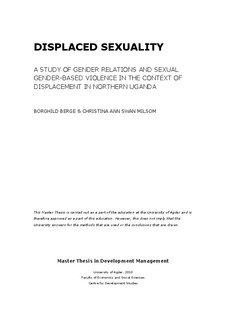Displaced sexuality : a study of gender relations and sexual genderbased violence in the context of displacement in northern Uganda
Abstract
There are many barriers to human development; gender inequality is generally acknowledged
to be one of these. In the patriarchal and displaced society of the Acholi in Northern Uganda,
this inequality has for decades been played out directly on the bodies of girls and women. As
females, many have experienced Sexual-Gender Based Violence (SGBV), whether in
physically forceful ways such as rape and forced sex by intimate partners, or in structurally
forceful ways such as transactional sex for subsistence.
This thesis examines SGBV in post-conflict Gulu and Amuru districts in Northern Uganda
from an endogenous perspective. Fieldwork was carried out in six different camps for
internally displaced persons in Gulu and Amuru from October to December 2009. A
qualitative research methodology, based on semi-structured in-depth interviews and focus
group dicussions provides the research framework of the study.
Through an exploration of local perceptions on how gender relations have been affected by
displacement, as well as an assessment of how internally displaced men and women in the
region talk about rape, forced sex between intimate partners and transactional sex, the thesis
sheds light on some of the causes and circumstances in which SGBV occurs. Finally, through
knowledge of the context studied, we attempt to pinpoint the ways in which SGBV can be
prevented. We argue that SGBV can be attributed to the interplay of factors on three levels:
on an individual level, on the contextual level of displacement, and on the overarching
structural level of patriarchy. Attempts to prevent SGBV should therefore consider this
interplay of factors, closely bearing in mind how individual factors are inextricably bound up
with structural factors and how victimisation is inextricably bound up with agency. The
importance of addressing gender relations and adapting policies to the local cultural context is
also emphasised throughout our study.
Description
Masteroppgave i development management- Universitetet i Agder 2010
